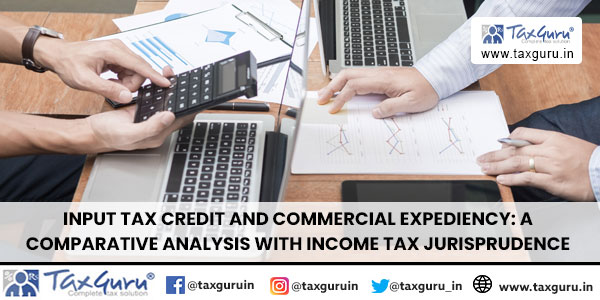While there is currently no established jurisprudence under the GST law regarding this issue, it is instructive to refer to the jurisprudence laid down by the Supreme Court in the context of Section 37 of the Income Tax Act, 1961. This section is similar to Section 16 of the CGST Act, as it allows an expenditure only if it is incurred wholly and exclusively for business or professional purposes.
Section 16 of the CGST Act, 2017 entitles an assessee to take input tax credit (ITC) charged on any supply of goods or services which are used or intended to be used in the course or furtherance of their business.
A critical issue arises: Can an assessing officer deny ITC by questioning the commercial expediency or wisdom of a business entity’s expenditures? In other words, can ITC be denied by demanding proof that an expenditure was necessary?
While there is currently no established jurisprudence under the GST law regarding this issue, it is instructive to refer to the jurisprudence laid down by the Supreme Court in the context of Section 37 of the Income Tax Act, 1961. This section is pari materia to Section 16 of the CGST Act, as it allows an expenditure only if it is incurred wholly and exclusively for business or professional purposes..

Historical Context and Legislative Intent
When the Income-tax Bill of 1961 was introduced in Parliament, the “necessity” of the expenditure was initially a condition for claiming deduction under Section 37. The bill read, “any expenditure… laid out or expended wholly, necessarily and exclusively for the purposes of the business or profession shall be allowed…”. However, due to objections raised by trade and business bodies, the word “necessarily” was dropped. This change underscores the legislative intent to avoid unduly restricting business decisions by imposing an overly stringent necessity test.
Judicial Interpretations: Commercial Expediency
The jurisdiction of the Revenue is confined to deciding the reality of the expenditure—whether the amount claimed as a deduction was factually expended and whether it was wholly and exclusively for the purpose of the business. The reasonableness of the expenditure can only be questioned to determine whether, in fact, the amount was spent. Once it is established that there is a nexus between the expenditure and the business purpose, the Revenue cannot justifiably claim to assume the role of a businessman or the board of directors to decide the reasonableness of the expenditure.
In the case of Atherton vs. British Insulated & Helsby Cables Ltd (1925) 10 TC 155 (HL), the House of Lords held that in order to claim a deduction, it is enough to show that the money is expended, not of necessity and with a view to direct and immediate benefit, but voluntarily and on grounds of commercial expediency and in order to indirectly to facilitate the carrying on the business.
Supreme Court’s Stance
The Hon’ble Supreme Court in S.A. Builders Ltd. v. CIT – 288 ITR 1 (SC) held that the expression “commercial expediency” is an expression of wide import and includes such expenditure as a prudent businessman incurs for the purpose of business. The expenditure may not have been incurred under any legal obligation, but yet it is allowable as a business expenditure if it was incurred on grounds of commercial expediency.
In CIT v. Walchand & Co. (P.) Ltd. – AIR 1967 SC 1435, the Supreme Court stated that when applying the test of commercial expediency to determine whether an expenditure was wholly and exclusively for business purposes, the reasonableness of the expenditure must be judged from the viewpoint of the businessman, not the Income Tax Department. The Appellate Tribunal may conclude that the alleged payment is not real or not incurred in the character of a trader, or is not laid out wholly and exclusively for business purposes, and disallow it. However, it is not the Tribunal’s function to determine the remuneration that should be paid to an employee of the assessee.
Subsequent Affirmations
In CIT v. Panipat Woollen & General Mills Co. Ltd. [1976] 103 ITR 66 (SC), it was affirmed that to fall within Section 10(2)(xv) of the Act, the claimed deduction must amount to an expenditure wholly and exclusively for business purposes. This assessment depends on the facts of each case. The reasonableness of the expenditure, adjudged from the businessman’s perspective, not the Income Tax Department’s, is essential.
Shahzada Nand & Sons v. CIT [1977] 103 ITR 358 (SC) reiterated this principle, emphasizing that these factors must be considered from the viewpoint of a prudent businessman, not based on a subjective standard of the assessing authority.
The Hon’ble Supreme Court reaffirmed these principles in Shiv Raj Gupta v. Commissioner of Income-tax, Delhi [2020] 425 ITR 420 (SC).
Conclusion
The principles laid down by the Supreme Court in the context of the Income Tax Act offer valuable guidance for interpreting Section 16 of the CGST Act. The denial of ITC by an assessing officer based on questioning the commercial expediency of an expenditure lacks jurisprudential support. The necessity of the expenditure should not be a factor in claiming ITC. Instead, as long as there is a clear nexus between the expenditure and the business purpose, and it is incurred wholly and exclusively for the business, the ITC should be allowed. Revenue authorities should respect the business judgment and commercial expediency of a taxpayer, focusing only on the factual reality of the expenditure.





